
Magento Enterprise Development: 6 Steps of Developing Commerce
Wondering about how advanced ecommerce improves your online business? Magento Enterprise Development helps businesses build strong and scalable online stores. It offers advanced features and customization options.
This article will explain how enterprise development can boost ecommerce strategy with Magento.
Key Takeaways
-
Learn what Magento Enterprise Development is and why it is important for business.
-
Discover how to pick the right Magento Enterprise developer for ecommerce.
-
Explore the benefits of using Magento Enterprise for an online store.
-
Learn how to set up your Magento Enterprise store settings for the best performance.
-
Discover the top Magento web development providers for ecommerce.
-
Explore the troubleshooting issues in Magento extension development.
-
5 Benefits of Using Magento Enterprise for Ecommerce Development
-
6 Steps to Configure Store Settings in Magento 2 Enterprise Edition
-
13 Top Magento Enterprise Development Providers for Ecommerce
-
Troubleshooting issues in Magento Enterprise Development Services
What is Magento Enterprise Development?
Magento Enterprise Development is ideal for large companies with complex needs. It includes tools for optimizing ecommerce, supporting both B2B and B2C operations. Companies can easily manage product catalogs and complex transactions.
With Magento Commerce Cloud, businesses benefit from scalable infrastructure and high performance. This makes it a top choice for digital commerce. Choosing a certified Magento enterprise developer ensures quality development services. It helps to meet industry standards and achieve high conversion rates.
How to Choose an Enterprise for Magento Development?
1. Experience and Expertise
When picking a development company, choose a strong history in Magento development. Check the portfolio for different projects. It can show they can build user-friendly Magento stores in their previous companies. The more varied their experience is, the better they can create solutions for the needs. Make sure they know the latest updates and Magento features of open source.
2. Certifications
Check if the developers have Magento 2 certifications. The certifications show that they know what they are doing and follow best practices. Certified professionals understand how Magento works, ensuring the project is in good hands. They also show that the developers keep their skills updated in a changing field. A certified team can help avoid common mistakes and improve your store's performance.
3. Services Offered
Look for a web development partner that provides many services. It is not just initial development and offer:
-
Custom development
-
Theme design
-
Ongoing maintenance
When one team handles everything, it makes future updates easier. Th approach ensures all parts of the Magento store are taken care of well.
4. Client Reviews and Testimonials
Check client reviews and testimonials to see how reliable the company is. Look for feedback on sites like Google, Clutch, or their website. Positive reviews suggest a good reputation, while negative comments can be a warning. Contacting past clients can give direct insights. It includes the company’s strengths and weaknesses.
5. Communication Skills
Good communication is key during development. Choose a partner who listens to what the need is and updates on project progress. Clear communication helps meet expectations and solve issues quickly. A responsive team encourages collaboration, making it easier to make changes when needed.
6. Post-Launch Support
Ask about the support they offer after launching the current site. A trustworthy partner should provide ongoing maintenance and help with any issues. It can include fixing problems, updating software, and monitoring performance. Good support keeps the store running and up-to-date. It reduces downtime and keeps customers happy.
7. Budget and Pricing
Set the budget before developers reach out to potential partners. Request detailed quotes from several companies to understand pricing. It helps to find a partner that gives the best value. Be careful of very low quotes, as they might mean lower quality. A clear Magento pricing structure explains what services are included. It helps to make a smart choice for the businesses to grow well in the future.
8. Technical Capabilities
Look at the technical skills of the development team. They should be good at Magento and related technologies like PHP, HTML, CSS, and JavaScript. A solid technical background helps them build a secure and efficient e-commerce site. Knowledge of modern tools can also speed up the development process. It also improves the final Magento product types.
9. Agile Development Approach
Choose companies that use flexible development, which focuses on flexibility and ongoing improvement. The method lets teams adapt quickly to changes. It ensures the final products or services match the vision. Agile development promotes teamwork and regular feedback, leading to better quality. By breaking the project into small stages, developers can see real progress.
10. Industry Knowledge
Picking a partner who knows the industry can really help the project. When they understand the Magento marketplace, they can offer solutions for unique challenges. An experienced partner can share insights into customer behavior and trends. It helps to enhance the ecommerce online store. The knowledge can lead to better strategies for engaging customers and boosting sales.
5 Benefits of Using Magento Enterprise for Ecommerce Development
1. Unmatched Flexibility and Scalability
Magento Enterprise gives the freedom to implement new ideas without tech limits. The headless solution is adaptable and lets developers create exciting commerce journeys. It keeps up with the customers and grows by supporting different business models. It manages large orders and the scalability ensures to handle ecommerce high traffic. It expands as the business grows.
2. Improved Performance and User Experience
With Magento Enterprise, businesses can offer a fast and responsive experience. The platform includes full-page caching and optimized images. It lowers bounce rates and boosts user engagement. Magento enterprise edition has AI-powered tools like Live Search and Product Recommendations. It helps shoppers find what they need quickly. Together, the features create a smooth shopping experience. It can raise conversion rates and keep customers coming back.
3. Capabilities for Global Expansion
Magento Enterprise is the right choice for businesses that want to grow worldwide. The platform supports multiple languages and currencies. It allows them to reach a global customer base and explore new markets for their brand. The feature is important for businesses that want to grow beyond local areas.
4. Easy Integrations and Customization
Magento enterprise development makes it easy to connect with various third-party apps. It includes extensions like payment gateways and marketing tools. The large enterprise creates a smooth ecosystem for the online store. The open-source design allows for endless customization options for the store:
-
Design
-
Features
-
Functions
The customization creates unique and personalized shopping experiences that set the brand apart.
5. Professional Support and Operational Confidence
When choosing Magento Enterprise, get access to a dedicated support team. It ensures the platform runs smoothly and any problems are quickly fixed. The Magento enterprise development reduces downtime and risks. The platform also provides enterprise-level security. It can handle thousands of SKUs and automatically adjust to high traffic demands. It gives the confidence to focus on growing the business instead of technical issues.
6 Steps to Configure Store Settings in Magento 2 Enterprise Edition
Step 1: Enable Full-Page Cache
-
Use this command in the CLI:
php bin/magento cache:enable full\_page. -
Or, through the Magento Admin panel:
- Go to System > Tools > Cache Management.
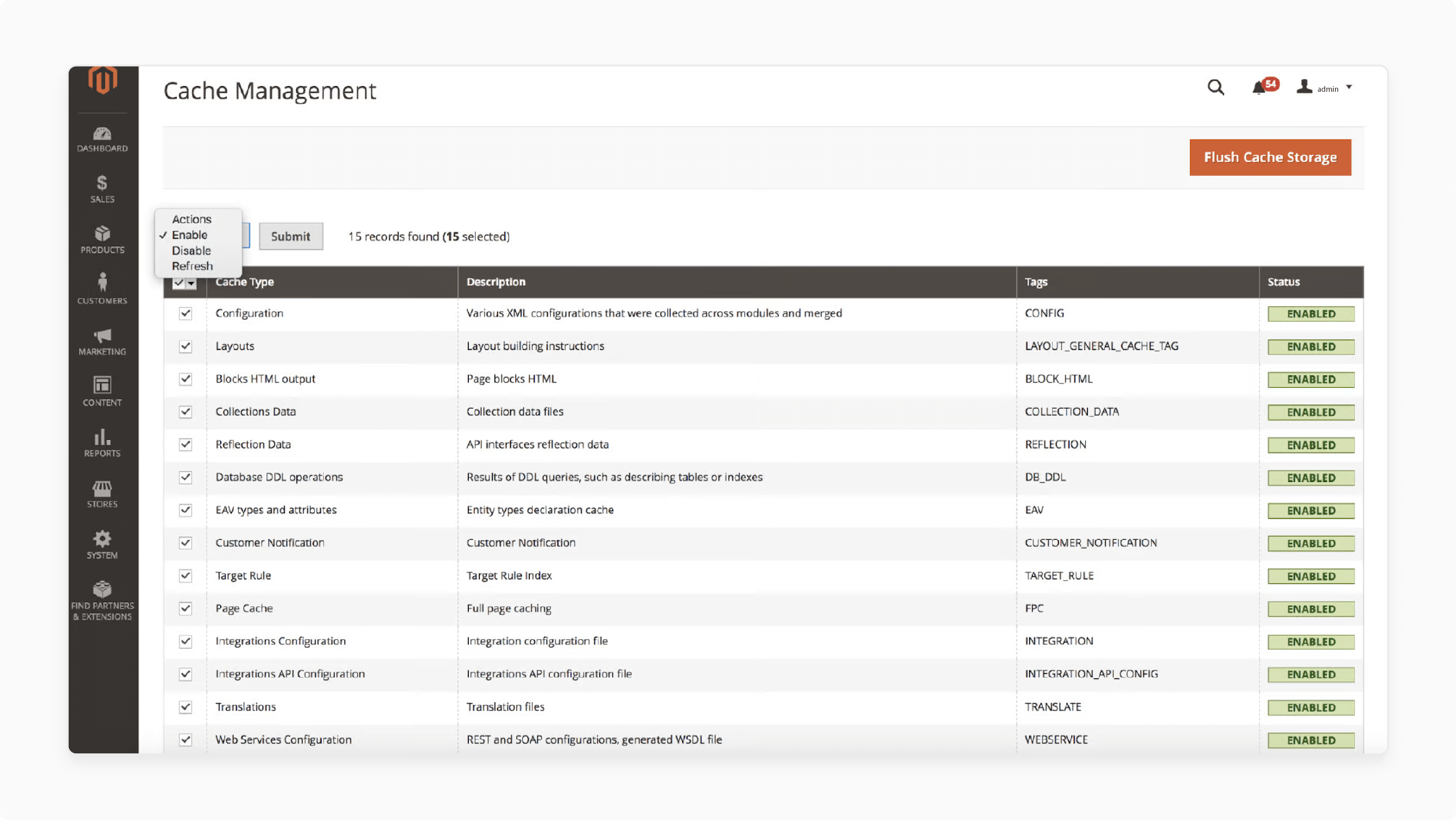
- Select the Full-Page Cache type.
- From the Actions dropdown, choose Enable and click Submit.
Step 2: Implement Varnish Cache
-
Log in to the Magento Admin as an admin user.
-
Navigate to Stores > Configuration > Advanced > System > Full Page Cache.
-
From the Caching Application dropdown, select Varnish Caching.
-
Enter a value in the TTL for the public content field.
-
Expand the Varnish Configuration section.
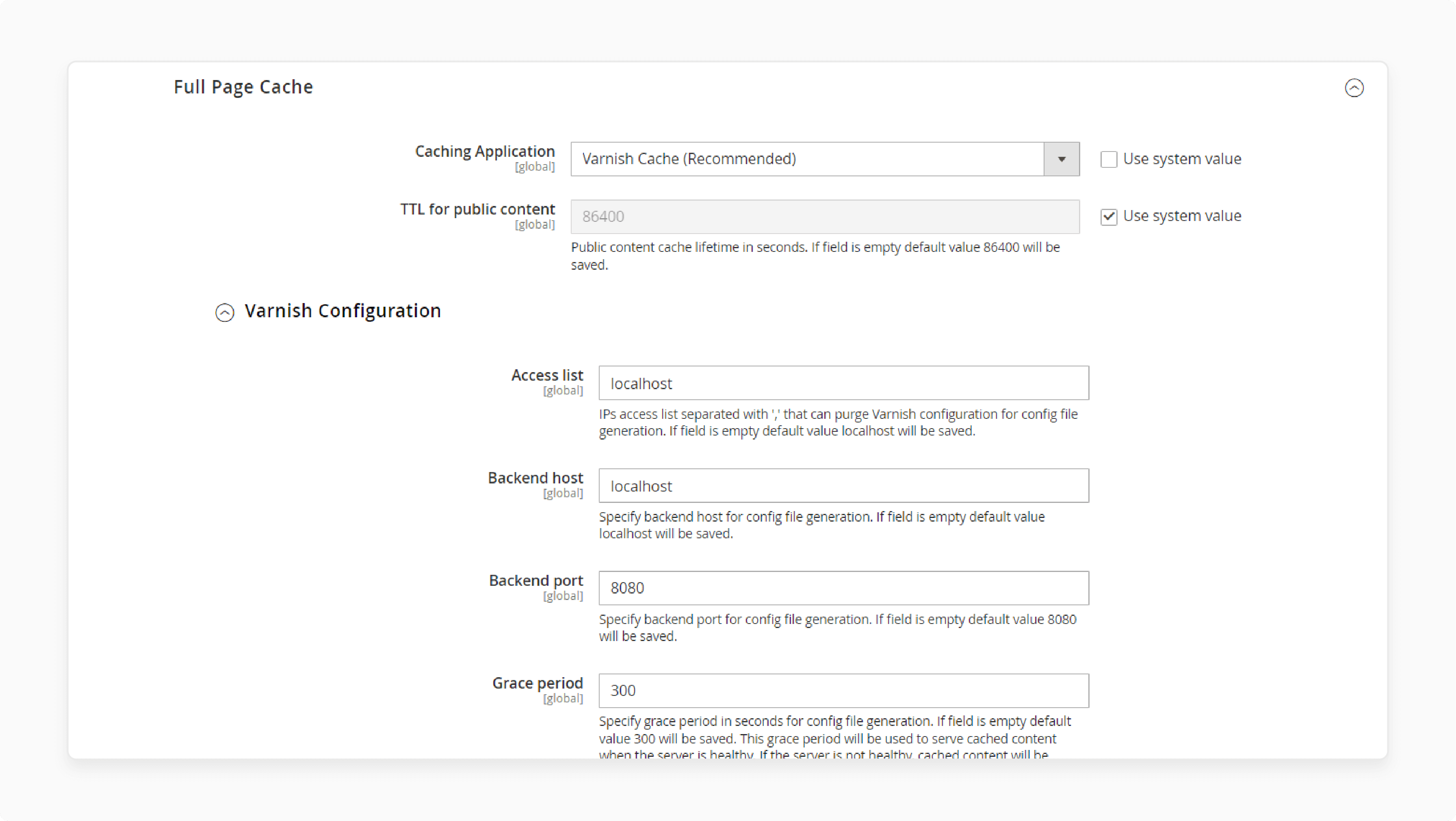
- Enter your specific Varnish cache setup details.
Step 3: Enable Production Mode
- To switch to production mode, run:
php bin/magento deploy:mode:set production.
Step 4: Optimize JavaScript and CSS
-
Make sure Magento is in production mode.
-
Go to Stores > Configuration > Advanced > Developer.
-
Set Minify Javascript Files and Minify CSS Files to Yes.
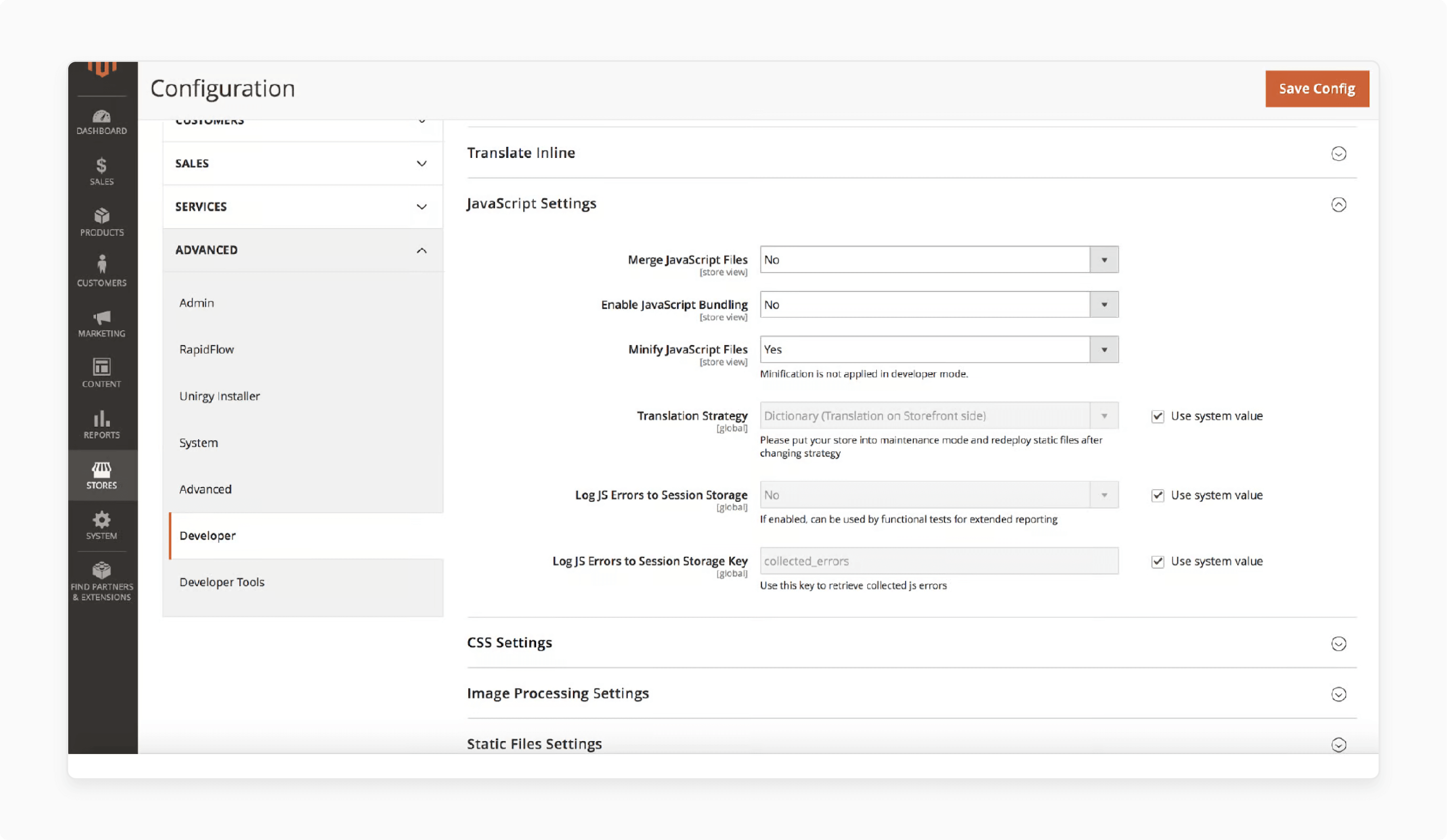
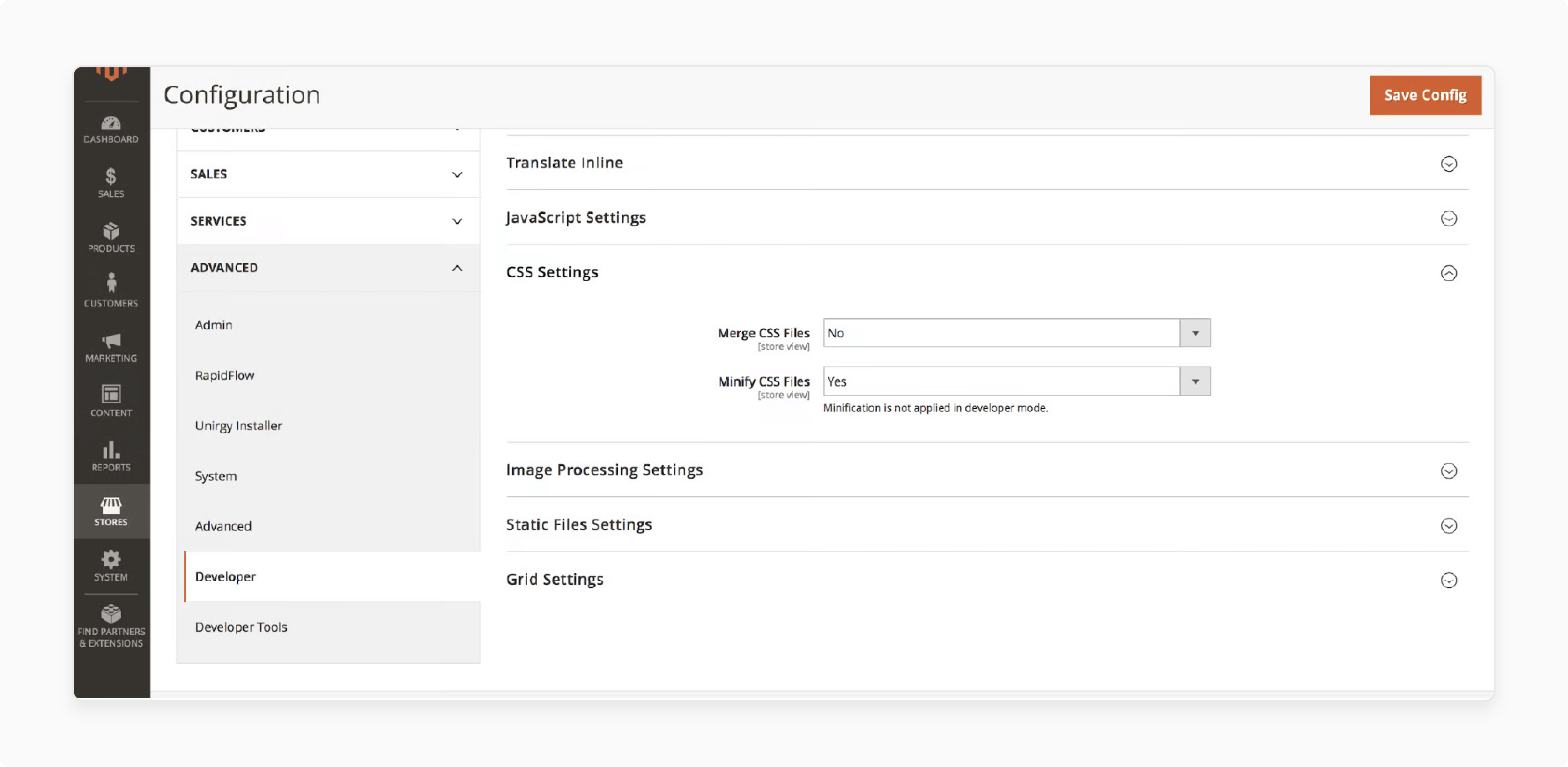
- Click Save Config and flush the cache.
Step 5: Enable Flat Catalog
- Navigate to Stores > Configuration > Catalog > Storefront.
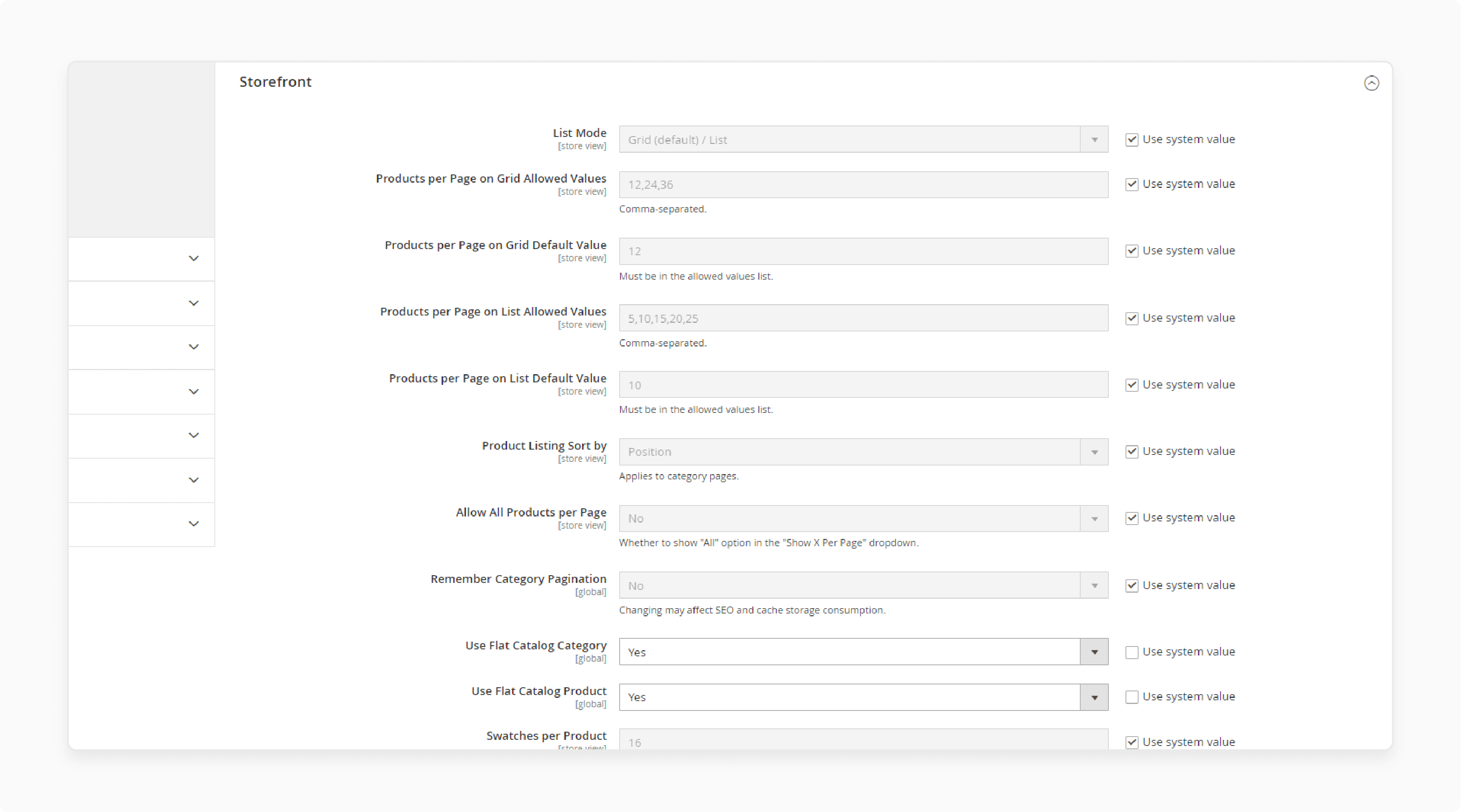
- Set use flat catalog category.
- Use Flat Catalog Product to Yes.
- Click Save Configuration.
Step 6: Configure Indexers
-
Set the indexers to Update on Schedule.
-
Run this CLI command:
php bin/magento indexer:set-mode schedule.
How to Configure Scheduled Tasks in Admin?
- Navigate to Store > Settings > Configuration > Advanced > System > Cron (Scheduled Tasks).
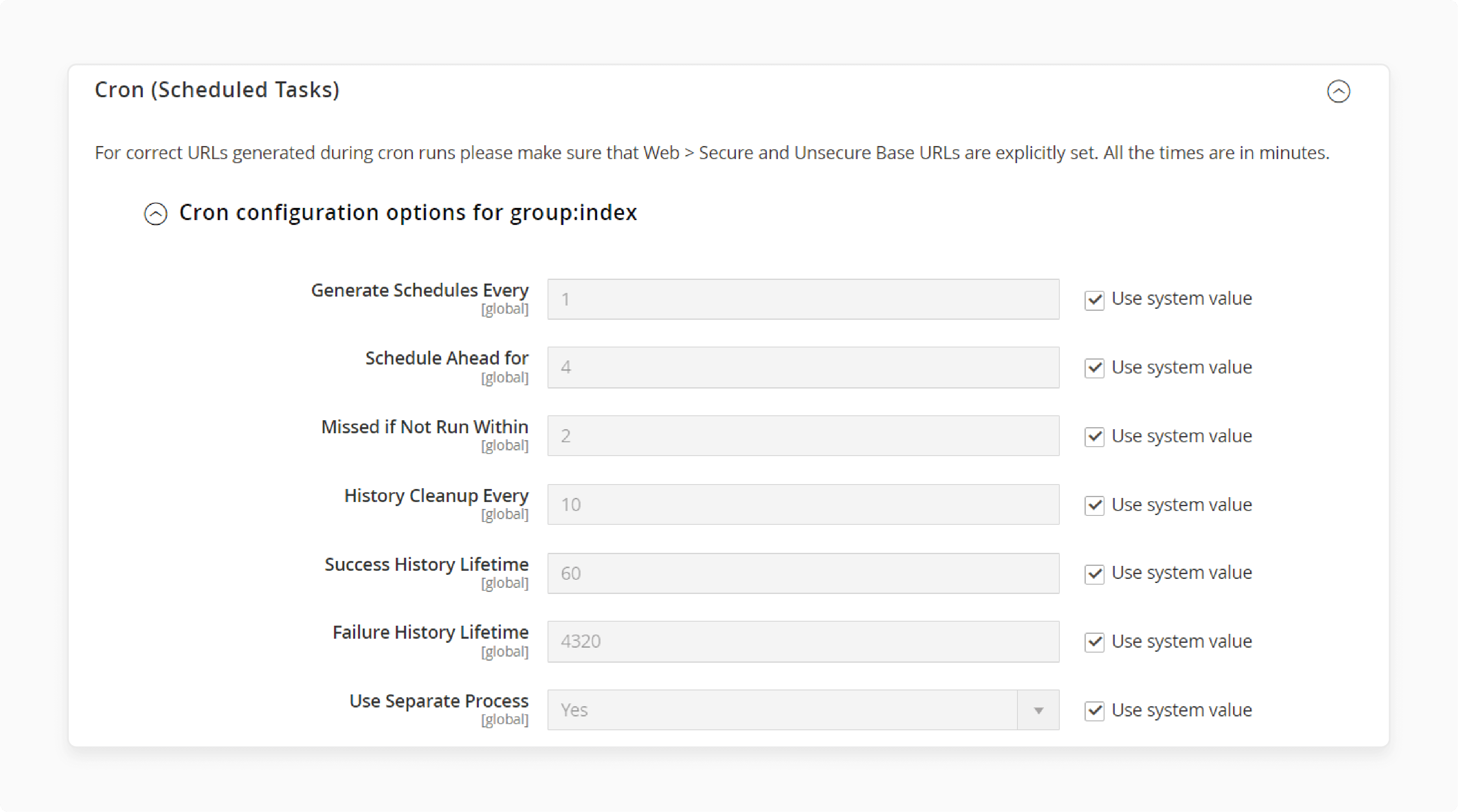
- Expand the Cron configuration options for the group: index.
13 Top Magento Enterprise Development Providers for Ecommerce
| Company | Location | Key Services | Industries Covered |
|---|---|---|---|
| Rave Digital | Chicago, Illinois | Ecommerce Solutions, Mobile App Development | Retail, Technology, Healthcare |
| GoMage | Austin, Texas | Magento Development, Mobile App Development | Startups, SMEs, Enterprises |
| Iflexion | U.S. and U.K. | Custom ecommerce, Payment Solutions, ERP | Retail, Distribution, Manufacturing |
| Panda Group | Rosemead, California | Mobile App Development, Responsive Web Design | E-commerce, Technology, Retail |
| Magento IT Solution | New York | Custom Development, Migration, Multi-Vendor Store | E-commerce, B2B, Marketplaces |
| Digital Silk | Miami, Florida | Digital Marketing, Magento Development | Hospitality, E-commerce |
| Elogic Commerce | Estonia, Australia | Custom ecommerce, Magento Support | Health, Retail, Technology |
| SmartSites | San Francisco, California | Magento Theme Development, PPC management | E-commerce and Retail |
| Simicart | Hanoi, Vietnam | Web/App Design, Magento Migration | E-commerce, Retail |
| Codal | Chicago, Illinois | User Experience Design, Full-Stack Development | Wide-ranging industries |
| Pixafy | United States | Custom Magento Development, Integration | B2B & B2C markets |
| Huemor | New York | Magento Theme Development, Custom Plugin Development | Health & Lifestyle, Retail |
| Forix | Portland | Web Design, Magento Maintenance | Corporate & Fortune 500 |
Troubleshooting issues in Magento Enterprise Development Services
| Issue | Description | Possible Solution |
|---|---|---|
| Slow Performance | An ecommerce site may load slowly, which affects the customer experience. | Optimize images and enable caching. You can also use a Magento optimization service to improve speed. |
| Configuration Errors | Incorrect settings can lead to issues with how the site works or is seen. | Check all settings in the admin panel to match business needs and Magento best practices. |
| Compatibility Issues | The latest version of Magento may need to be fixed with installed Magento modules. | Regularly update your extensions. Make sure they are compatible with the version of Magento you are using. |
| Error Messages on the Frontend | Users might see error messages or blank screens while browsing the site. | Look at error logs and verify that all Magento modules are installed. Check for errors in any Magento custom changes. |
| Payment Gateway Failures | Customers may face problems during checkout due to issues with the payment gateway. | Work with experienced Magento developers to check and fix payment module settings. |
| Mobile Responsiveness Issues | The ecommerce site might not display properly on mobile devices, affecting user engagement. | Test the site on different devices to ensure it looks good on mobile. |
| Custom Theme Problems | Custom themes may not show correctly or might break some features. | Validate Magento customization services to make sure the theme meets Magento standards. |
| Security Vulnerabilities | Magento sites can be at risk if they are not updated or secured regularly. | Conduct security audits and update the latest version of Magento. |
| Data Migration Errors | Moving data from another platform can cause loss or corruption of data. | Use professional Magento development services that specialize in data migration. |
| SEO Optimization Issues | Poorly optimized ecommerce sites may need help being found on search engines. | Work with Magento commerce development to improve SEO settings. Get expert advice on search engine optimization. |
| Search Functionality Issues | Customers may not find products because the search feature is broken. | Review the Magento 2 extension development for search features. Check the indexing settings as well. |
| Inadequate Documentation | Not having good documentation can confuse a Magento project. | Ensure all related services and custom changes are well-documented for future teams. |
FAQs
1. What are the development costs for Magento Enterprise?
The development costs for Magento Enterprise can change. Factors include project complexity and the Magento enterprise development company you choose. It is important to talk to Magento experts to get a clear estimate for your budget.
2. How can I customize Magento for my store?
You can customize Magento in several ways. Hiring a development agency can help with custom Magento 2 solutions. You can also use custom extension development to add new features to your website.
3. What are the benefits of using Magento Enterprise solutions?
Magento enterprise edition offers many benefits, like scalability, strong security, and excellent performance. They make store development easy and offer features that improve the customer experience.
4. Who are the Magento commerce developers?
Magento commerce developers are experts who focus on the Magento platform. They specialize in design and development. It helps businesses set up and enhance their ecommerce websites. A team of Magento experts can create solutions tailored to your needs.
5. How do I find a Magento partner for my project?
To find a Magento partner, research Magento enterprise development services. Look for highly skilled Magento teams with experience in Magento e-commerce development. Check their work and client reviews to ensure they fit your needs.
6. What is the latest version of Magento 2 Commerce?
The latest version of Magento Commerce usually has new features and improvements. Keeping your store updated is vital for security and performance. Talk to expert Magento enterprise developers to ensure the latest version.
7. What services do Magento experts offer?
Magento experts provide various services, including:
-
Site optimization
-
Help with migration
They assist with Magento conversion and ensure the store runs throughout the development process. Their skills can lead to unmatched Magento solutions designed for your business.
Summary
Magento Enterprise Development is important for businesses. It uses the latest Magento updates and development solutions. Magento website development services help businesses create custom online stores. These services include:
-
Building new Magento ecommerce websites
-
Upgrading existing Magento community stores
-
Creating custom extensions
-
Designing unique Magento themes
-
Optimizing Magento ecommerce store development for better performance
Explore managed Magento hosting to enhance enterprise development for your ecommerce business sites.









